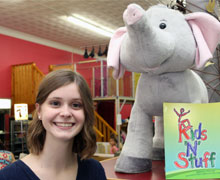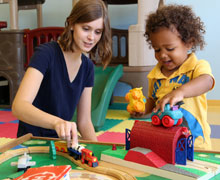For Zinkel, ’17, a Summer of Kids, Cookies and Research
Related Programs
Related Posts
Connect With Us
Psychology major studies the fundamental attribution error in children
September 6, 2016
By Jake Weber

Katie Zinkel is a senior majoring in psychology and minoring in educational studies. She is the daughter of Pamela Zinkel of Birmingham and a graduate of E.W. Seaholm High School.
Katie Zinkel, ’17, gave a lot of cookies to a lot of kids this summer, but one instance really stood out. “Once I gave kids their cookies and their mom told them, ‘You need to thank the lady. It’s not every day you come to a children’s museum and get to participate in a psychological experiment.'”
It’s the rare undergraduate who can get approval for experimental research with children, but Zinkel’s academic studies and interest in child development lined up perfectly in Albion. As a first-year student, Zinkel got a job with Kids ‘N’ Stuff Children’s Museum downtown, because she was interested in studying child development and because she just liked being around kids. Two years later, it wasn’t difficult for her to approach the director and ask for the museum to host an experimental research project, funded by the College’s Foundation for Undergraduate Research, Scholarship and Creative Activity.
The museum’s support was critical, Zinkel says, because as difficult as the approval process is for experiments involving children, finding participants is harder. “It’s tough to get parents to participate when they have to bring their kids to a psychology lab in an academic building,” Zinkel explains. “Having a space at a children’s museum made it a lot easier. It was pretty special.”
Zinkel decided to study the “fundamental attribution error” (FAE), a phenomenon well understood in adults but less so in children. “The FAE happens when we overestimate how much someone’s personality influences their behavior, while underestimating how a person may be influenced by a given situation,” Zinkel says. “In adults, the likelihood of making this reasoning error tends to increase when trying to explain the behavior of strangers as compared to people we care about.”
For example, “if a stranger cuts you off while driving, you would likely assume that they are a jerk. If it’s someone you know, you might think of reasons to explain their behavior—maybe the sun was in their eyes or they were late for work,” Zinkel explains. “I want to try to understand if and when children start making this reasoning error and why.”

“Having a space at a children’s museum made it a lot easier,” Zinkel says of her research project. “It was pretty special.”
For her project, Zinkel talked to kids between the ages of 3 and 10, asking them why they think a friend or an “imaginary kid” might have taken or shared a cookie. “I got very different responses from the kids, with everything from ‘because they were hungry’ to ‘peanuts’ as explanations for the pretend behavior. Now I’m analyzing the data to understand specifically how children attributed the behavior and whether they regularly made the FAE or not,” Zinkel says.
Doing research with children, Zinkel learned, can be a challenging process. On busy days, Zinkel was overwhelmed with participants; other days she sat for hours and saw three children. Also, “it was a bit nerve-racking to go around and ask parents if their children could participate. I didn’t get that many refusals, but it still was difficult,” she recalls.
She learned a bit about parents, too. “After the activity, many parents stood and talked to me for 15 or 20 minutes. They were fascinated with what I was doing and many then jokingly asked me to analyze their kids,” Zinkel marvels. “I was pleasantly surprised at how supportive and interested parents were.
“I’ve learned that I really love developmental research, and I’ve learned that it is an enormous amount of work,” she continues. “I’ve loved the work, though, as learning about research studies in classes has always been fascinating to me, and getting to actually do one myself has been exciting and fulfilling.
“I want to continue this research and dive deeper into this subject for my senior honors thesis,” Zinkel concludes. “Now that I’ve actually had a taste of what I would be doing as a job, I can say with more certainty that this is a career path I would greatly enjoy. It’s something I don’t have to wonder about hypothetically, because I have this wonderful understanding from my own experience.”
